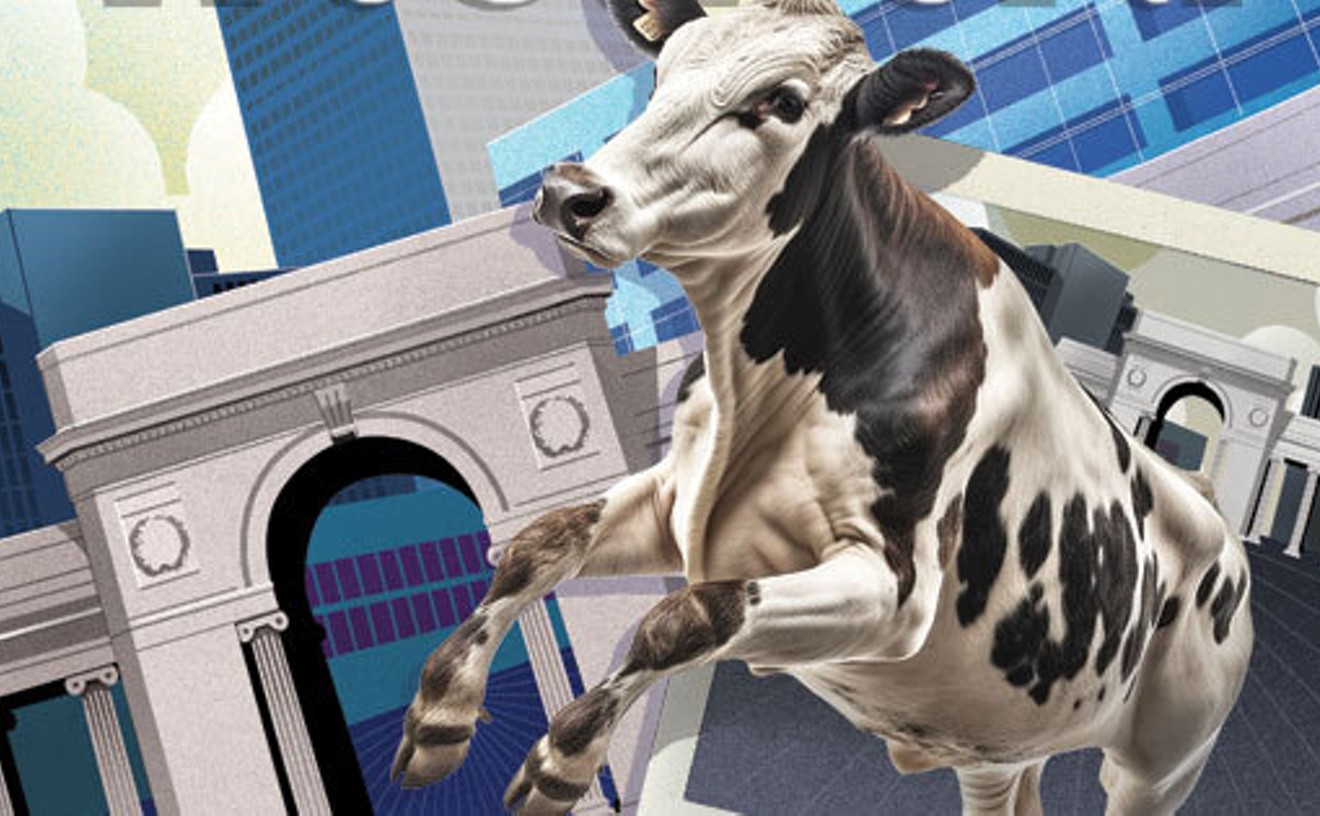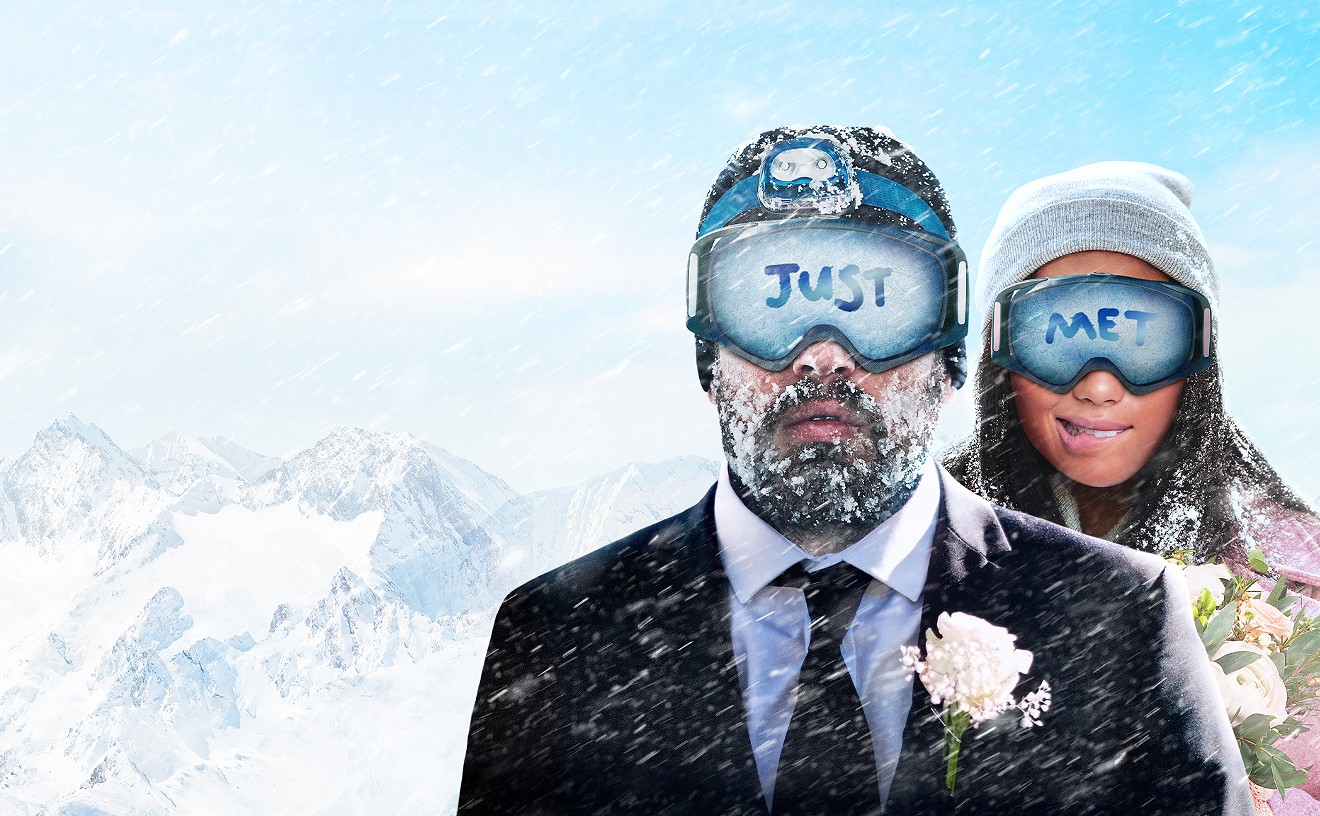Gordon will read this Sunday at 4 p.m. at the Innisfree Poetry Bookstore and Cafe in Boulder, along with Graham Foust, Eleni Sikelianos and Anne Waldman. We caught up with Gordon, a CU Boulder assistant professor and Letter Machine Editions co-publisher, about Rooster, how failure as a musician led him to poetry, and his decision to dedicate his release to the memory of fellow Colorado poet Jake Adam York.
See also: - Poet Serena Chopra on contemporary loneliness and her first full-length book - Jake Adam York, Colorado poet and teacher, dead at forty - Westword Book Club: J.A. Kazimer on peeing in a bottle and writing what you know
Westword: What was your process for writing the book?Noah Eli Gordon: I started in 2004 on January 1. I gave myself this task of trying to write one ten-line poem every day for the entire year, and I got to about maybe 35 or 40 days and started realizing that my hair was going gray for the first time. [Laughs]. I was totally flabbergasted with the immensity of the task and gave it up. But then looking back at all of those things that I had written, I realized that they had some interesting common theme, which was a kind of anxiety about the role of the artist, uncertainty about the authoritative use of language, and then a dedication to both looking out at the world and recording and looking at oneself looking out at the world and recording. So I started putting them together, got rid of all the titles that I had originally given them, and decided that that would be the beginning of this long poem that turned into what's more or less the meat of the book, which is "The Year of the Rooster" poem.
How did you continue to develop it?
From there this weird, strange character of the Rooster appeared out of nowhere. I think part of it was because at the time I was reading a book by Alice Notley called Disobedience, which is a really wonderful book, but it has these strange characters that appear here and there that I just didn't understand aesthetically. I didn't understand what they were doing, what was going on, and how they functioned in the work. I think in order to wrap my head around that I decided to try something similar myself. So instead of trying to completely figure it out I thought I would take an intuitive approach and more or less feel it as a kind of mode. I let this character appear throughout the book, and I think it's really purposefully unclear who the speaker is sometimes. Is it a he? Is it a she? Is it this Rooster? Is it me? Is it the self? But what the book is interested in doing is demonstrating through example and enactment the slipperiness of our use of pronouns and how they feel so steadfast and concrete when we encounter them in day to day life, but the truth is there's a kind of artistic imperative that can drive their deployment. I think if we start to recognize that slipperiness it can only, in a way, open us up in general to the truth of how uncertain pronouns are for so many people out there.
You use lines from Bernadette Mayer, "A woman I mix men up," and Alice Notley, "He's wearing both a dress and pants," as an intro to the title's poem that speak to this interesting use of gendered pronouns. What made you want to explore gender in that way?
I think one of the things about perceived ideas about gender identities is that, as Judith Butler says, gender is a performance. It's a construct. It's not something that we have to completely buy into. It's really interesting for me right now because I have a 9 month old girl and I've found that it's almost impossible to avoid already ascribing her to some kind of codified sense of gender just via the clothing that's available. I try not to actually dress her in anything that signifies in one way or the other, but regardless that then therefore signifies. Which is to say people all the time say, "look at your cute little boy," because I don't have her in pink dresses. Initially I would correct people, but then after a while I decided I'm not interested in spending my time correcting strangers about it or whatever. But it spoke to something really intriguing to me and that's something that the book itself is trying to get at. What happens if we do take these seemingly monolithic ideas about what constitutes the way to live and start to explore them a little bit? What happens if we take all the statues that have already been erected in the park and say, well, let's see what's going on with the foundation of this statue? Let's actually read the plaque and see what this information is. I think partially, too, because it wasn't something that I had done previously. As a poet I'm always interested in challenging myself, so I think that gender itself was a construct hadn't entered into my work. So it was like, maybe it's time for me to do that.
What made you choose the Rooster as a way to explore those themes?
Partially it wasn't that I chose it as much as it chose me. I can't even remember where it came from, but at some point this word "Roo" popped up in the writing. If you're thinking about different notions of masculinity, all of the kind of negative definitions that we can ascribe to it definitely play themselves out in the rooster as this figure of protector or aggression. More or less, the rooster is the ultimate mansplainer. It's like waking up in the morning saying, "Hey world, let me tell you how it is. The sun's up. Look at me." I thought that was a kind of interesting thing to pull apart.
You mentioned that you were sort of questioning the role of the artist and throughout the book, "blah blah blah" is repeated. Does that relate to this questioning? Did you discover through writing any more of what you think is the role of the poet?
The interesting thing to me and my relationship with poetry is that it's constantly changing and I'm constantly having to refigure those things that initially I felt strongly and steadfastly aligned with. The older I get and the longer I've been doing this I find, wonderfully and bewilderingly, the less I seem to know about it. But I think that's actually a gift, because I feel much more open to all sorts of possibilities. I think the "blah blah blah" that does appear throughout in a way is a kind of a response to and attack on some of the excess noise that arises around discussions about what one should do and how one should do it. I'm so much more interested in someone showing me all these different ways rather than telling me this is how it is.
Surrounding the title's poem are an intro and outro titled "Diminishing Returns" and "Returning Diminishments." Were those written separately from the main poem?
Yeah, those were totally separate and probably were written a little bit later in terms of timeframe. Those started off when I was interested in seeing what would happen if I took a form that has so much historical baggage, which is the sonnet, and let it kind of melt away and fade away and then rebuild it again. In the beginning it starts off with 14 lines and then each one drops a line as it progresses. In the end it starts off with one line and builds itself up to a sonnet. The little inside joke that I embedded in there, though, is that if you look at the ninth line of each of the poems it begins with the word "turn," which is a kind of play on one of the main components of the sonnet: the volta, which is the turn at the ninth line, classic sonnet structure being like a statement or argument and then a resolution. So instead of really applying that kind of standard to these sonnets I was making a kind of in joke with having the turn or the volta just begin with the word "turn."
In the sonnets you use imagery of music and musical instruments as well as the stage--can you talk about where that comes from?
The truth is the only reason I'm a poet is because I was a failed musician. Starting in high school I was in a punk/ska band, and then in college I played in different noise bands and grindcore bands, and at a certain point I lived in a garage with a drumkit and Marshall Half Stack and all these instruments and had practice with two different bands twice a day. But then at a certain point realized that I really wasn't good enough to do anything with music on my own and I had to rely on other people. So I thought, I just need to find an art form that I can do by myself, on my own. At the time, I more or less discovered poetry. In college I started reading T.S. Eliot and I was hooked. So I thought, I'll try this. I sold all my musical equipment and said, I'm just going to be a poet. That's all I'm going to do, and just dedicated myself to it for the next fifteen years. But that urge and desire to be a musician and an active, practicing, playing one still totally drives me and I play all the time. I just know I'm never going to amount to anything really wonderful in it. I know I never even really totally wrapped my head around music theory and how to play, etcetera etcetera. But that ghost of a desire still is there and present in the dark hallways of all of my poems, that notion that I wish I had stuck with the music, that I was still in a band. I like to toy with the lexicon of music because I'm no longer toying with the actual instruments.
Do you remember the first poem you wrote after selling all of your musical equipment?
I don't think that I can. I wish I could. What I do remember, though, is the first poem that I had published when that first happened, which was pretty close to me getting rid of all that stuff. I just remember when that happened it felt like some sort of validation. Like, okay, maybe I'm doing the right thing. Maybe I'm on the right track.
Is what people get out of reading your work something that you think about?
I think that's a good question and an important question, because I think it speaks to the misconceptions that a lot of us have and carry with us about how poetry works, and even about how a lot of literature works. Which is to say that it's something that one can encounter, unwrap, pull apart, and squeeze out whatever it is that they're supposed to take away and simply take that thing away, this sort of chunk of knowledge, when we don't do that with other art forms. We don't go to a concert and say, oh, what do I take away from this other than the experience in and of itself. What I think is really important as an artist is shaping and crafting something that's recognizing the experience you're offering someone else. Something to guide that experience, but not attempting to wholly and fully dictate the parameters of that guidance. I'm much more interested in offering someone many possibilities than I am in pointing at something very specific and saying, this is it.
What are you working on next?
I am working on so many different things at the same time. Right now I am working on a book called Dysgraphia, which is more or less a memoir that deals with the role that learning disability has had on my life as both an educator and a writer. I've been working on that for about seven years now. It's straight-forward prose. In poetry I'm working on a very strange book called An Index to 800 Works by Noah Eli Gordon, which is a list of theoretical and possible writing projects, so not necessarily ones that I've actually done, but really kind of wild possible ones, theoretical ones, and hopefully the numbered lists become in and of themselves poems.
You dedicated the book in memory of the late Colorado poet and teacher Jake Adam York. What made you want to do that?
It was actually right when the book was going to press and I was making final edits on the book that the news had broken about Jake's sudden death. It was a shock. And I think that shock sent ripples throughout the poetry community, both locally here where Jake was responsible for so much wonderful and important work, and then further out nationally and even internationally. Jake was a monumental figure and force for good in the world and it left a huge hole in our collective hearts when it happened. That page originally in the book was a list of other works by me or something like that and I thought, I don't need that in there. I want to do some small kind of commemorative gesture to help honor the presence that he had.
Follow @WestwordCulture










